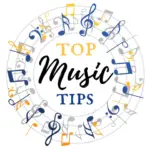Marching band is a unique form of music performance and entertainment. There are many hours that go into learning a halftime show, and you have to play your instrument throughout an entire football game. For the band to look and sound their best, students must attend band camp at their high school before the school year begins.

If you are going to be starting high school next year, or you are interested in joining the marching band and are already a student, band camp is necessary.
I’m sure you have heard jokes about “this one time at band camp…” but the truth is, band camp is fun, and you are a more confident musician and marcher at the end of the week.
That being said, check out the list below of 11 things you should know about band camp. We can help answer some of your questions about what happens at band camp.
1. Why Should You Not Drink Milk Before Band Camp?
While many enjoy a nice bowl of cereal in the mornings or a cool glass of milk, it is not a good idea if you are attending a band camp.
Drinking or having milk before arriving at the field at band camp will cause you to vomit—a lot. The milk will curdle in your stomach, making you nauseous or causing you to throw up.

There will always be at least one freshman at band camp who makes the mistake of drinking milk and has to learn the “No Milk” lesson the hard way.
Throwing up at camp leaves you dehydrated, which can lead to fainting or other heat-related illnesses.
If an upperclassman mentions not drinking milk when you sign up for the marching band at your school, they aren’t trying to prank you or freak you out. They have seen what happens when someone drinks milk before band camp and may give you a warning.
2. How Do You Not Pass Out at Band Camp?
This is tricky because you can’t control your body’s response to heat while at band camp. There are some ways to decrease your chances of passing out.
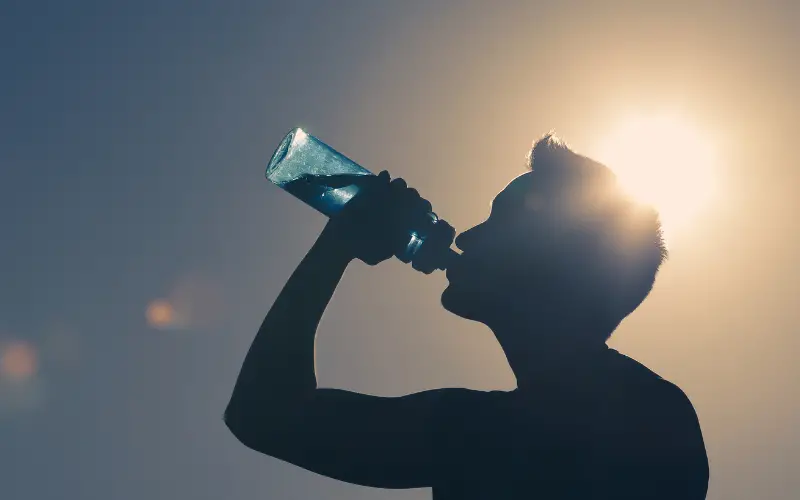
Drink Plenty of Water!
Hydration is the key to avoiding passing out, but it achieves nothing if you only hydrate the morning of camp. It is strongly recommended that you start drinking more water every day before you have to attend camp.
You can buy water bottles with hours marked on them; the goal is to drink enough water every hour. The bottle helps guide your water consumption throughout the day.
You do not need to buy a special bottle if you do not want to; many people will carry around a 1-gallon jug of water and add hour markers to the jug with a permanent marker.
Note: Setting timers is helpful if that works best for you. You will decrease your chances of passing out if you consume more water at least a week or two before band camp.
Here are some examples of time-measured bottles and a plain 1-gallon jug of water.
The bottles can be found in any major retail store or online via Amazon. You can buy a big jug of water from grocery stores, Walmart, Target, and even gas stations for less than 5 dollars.
Don’t Lock Your Knees!

Another pro-tip for not passing out at band camp is not to lock your knees. Locking your knees disrupts the flow of blood through your body to your brain, which can cause you to faint.
This may sound crazy since you will be marching with straight legs and standing in an attention position for hours. You can have straight, solid legs with soft knees by keeping them slightly relaxed.
Soldiers use the “don’t lock your knees” trick to avoid fainting; if it works for them, it will work for you.
Please do not freak out about the possibility that you may pass out at band camp. You may not pass out the entire time you are at camp; we mention fainting because it is something you may see or experience.
If you feel like you may faint (dizzy, your vision browns out, weak), stepping out of formation and sitting down with your head between your knees is okay.
If you do pass out, do not worry about your instrument. Your health and safety matter more than an instrument being dented or damaged.
Remember: if you do pass out, it is not something to be embarrassed about. Your director, drum major, adult staff members, and anyone who is a lifeguard (or EMT in college) will drop everything to help you if you pass out.
Marching bands aren’t just a music ensemble. Marching bands are a big, sweaty, and sometimes quirky family that looks out for each other.!
3. What Should I Eat Before Band Camp?
Since milk can make you vomit, you should avoid a big bowl of cereal in the morning before going to band camp.
Foods like bagels (you can add cream cheese, it will not curdle in your stomach as milk does), waffles, pancakes, muffins, oatmeal, and even an acai bowl are great choices to have before band camp.
Ultimately you should consume something that is high in carbohydrates. Carbs provide your body with glucose which your body turns into energy.
That energy is what your body will “burn” as you are engaged in physical activity. Eating foods like eggs, nuts and seeds, and meat will supply your body with proteins which are great for marching band camp. Protein helps repair and replace cells in your body, especially in your muscles.

Fruit is also an excellent option to eat before band camp. Fruits like bananas, oranges, apples, and watermelon are loaded with essential vitamins and minerals that keep your body operating at its best.
As long as you avoid milk (and yogurt) and do not overeat, you will be prepared to attend band camp.
Note: If you are someone who doesn’t usually eat breakfast, you will want to make an effort to eat at least something before coming to camp. The biggest mistake you can make besides not wearing sunscreen is to skip breakfast.
4. Should I Wear Makeup to Band Camp?
This is another difficult question to answer definitively. Wearing lipstick/gloss, eye makeup, and fake lashes should be avoided if possible.
Playing music with lipstick or gloss on is bad for your horn and isn’t sanitary. Eye makeup and lashes can cause pain or irritation to your eyes because sweat can make powders and liners run into the eye, and lash glue can melt away.
Is it a great idea to wear makeup to band camp? No. However, it is okay if you are self-conscious and want to cover up blemishes. Apply the makeup after applying sunscreen to ensure you have sun protection on your face first. Remember that you will be sweating a lot, which can cause foundation and concealer to run or be wiped off easier than they usually will.
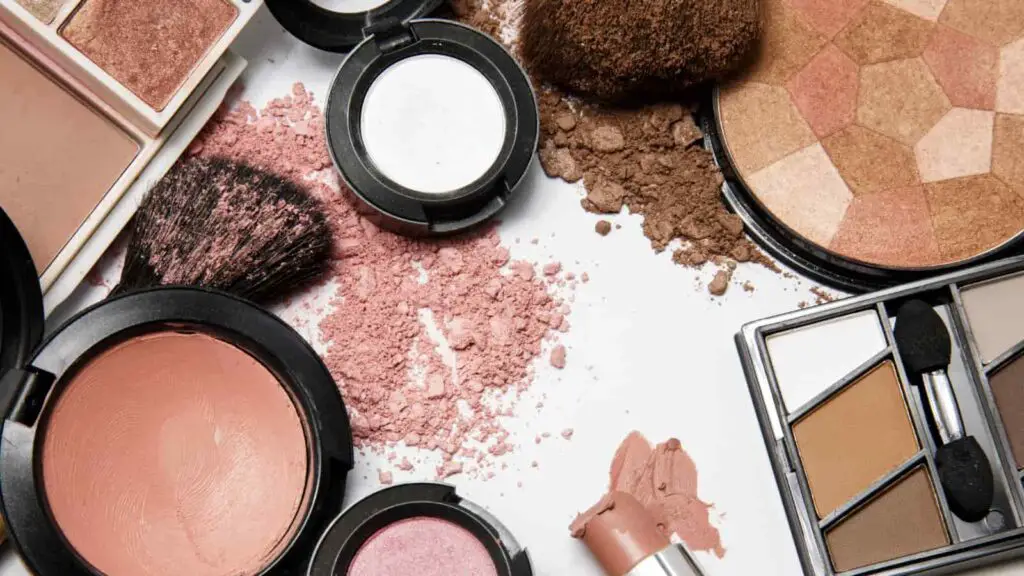
If you are more comfortable wearing foundation and concealer, go for it. Just know it will not look great by the time you come inside for lunch.
You are in high school, which means breakouts that can make you self-conscious, and makeup may help you feel better. That being said, when you sweat, your pores open more, and makeup and sweat can potentially lead to more breakouts.
What is important to remember is that nobody there is judging your skin. Everyone is there to march and play music and is more concerned about themselves than anyone else.
Whatever makes you more comfortable and allows you to focus on what you are learning at camp is fine. Nobody is expecting you to show up looking flawless.
5. How Hard is Band Camp?
Band camp is challenging at times, but it isn’t necessarily hard. When it comes to the musical aspect of band camp, learning new music or being asked to memorize music can be a bit intimidating.
Marching band camp is a music class, and you will rehearse your music at camp and work on cleaning it up. Don’t worry about memorizing music if it is not required; you will use a lyre and a flipbook to hold and view music while playing on the field and in the stands.
The physical aspect of band camp can be a bit challenging. Everyone must warm up their bodies together before any marching can begin, and your leadership team or drum major will lead everyone in stretches and exercises at the start of the day.
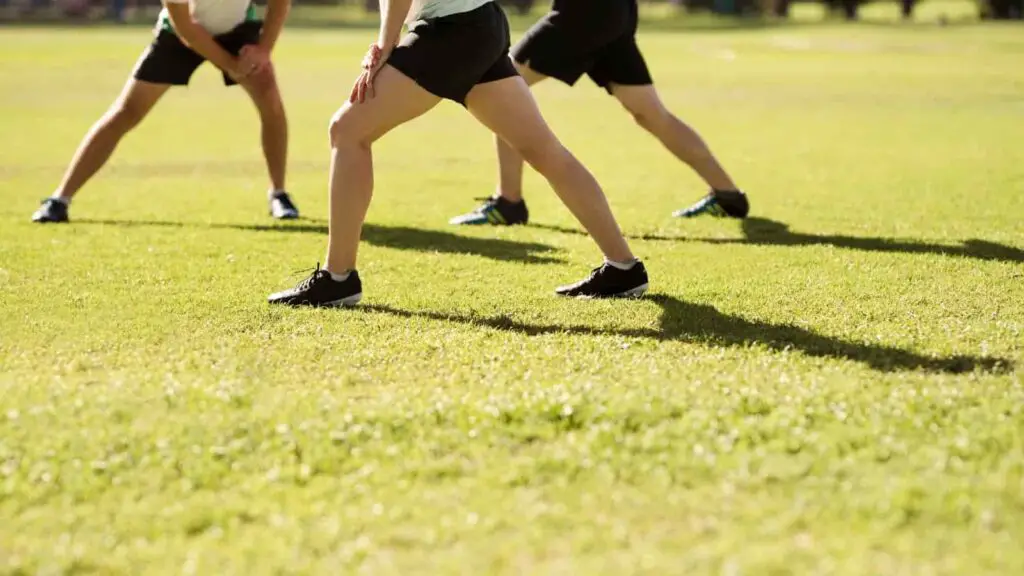
This can include push-ups, jumping jacks, squats, running in place or around the field, and possibly bleacher runs. For those unfamiliar with bleacher runs, everyone will run in a single-file line up and down every row of bleachers to get your blood pumping and build up your stamina.
Do not worry if you are not in great shape or never do any of these exercises daily; it’s only band camp. This is not the military, and as long as you try your best, that is all that matters.
It is okay if you are the last to finish running the track or bleachers. The band will wait for you to finish every single time. Putting in effort and not giving up because it’s “hard” is what matters; trying is the key. Don’t push yourself to the point you become injured; nobody expects you to be the next Usain Bolt of the marching band.
You may be sore after the first day of band camp, which, while uncomfortable, is totally normal.
You will be holding an instrument for hours, and large brass instruments can be heavy and make your arms and wrists sore.
If this is your first time using a marching horn, everyone in the section knows that this is very new and you have yet to build up the same amount of strength as they have. Everyone starts the same way, and it’s a learning and growing process that can span four years.
Learning how to march is going to be awkward at first. It is new, and your body isn’t used to it yet. You must walk a certain way, march backwards on your toes, and twist your upper body, so your shoulders face the drum major while walking sideways.
It may seem hard at first, but it becomes easier and easier every day and at every practice. As long as you try your best, that is all that is being asked of you.
Something that might be new and hard is yelling and following commands. Your drum major or leadership team will shout commands and yell as you practice marching and may call you out if you are not doing something right.
This isn’t to embarrass you; it is to ensure you do everything correctly and safely. Nobody is yelling because they are mad at you; they aren’t trying to scare or upset you. It’s hard for everyone to hear a drum major or other leadership members while you are spread across a field unless they have a microphone or megaphone; they have to yell.
6. What Happens at Band Camp?
Stays at band camp. Just kidding, what happens at band camp is learning to march and practicing music.
You will all head out to a field (or parking lot) in the morning, work on marching technique, and practice combining different maneuvers to complete a short routine. When it is noon, the whole band will sit in the shade or return to the room to eat lunch.
After lunch, it is typical for the band to grab their instruments and practice the show music and stands music as an entire ensemble.
You will have to stand and use a music stand or lyre to hold your music. Music rehearsal is just like concert band or orchestra class at school, but everyone stands up while they play. After group music rehearsal, the band breaks into sectionals.
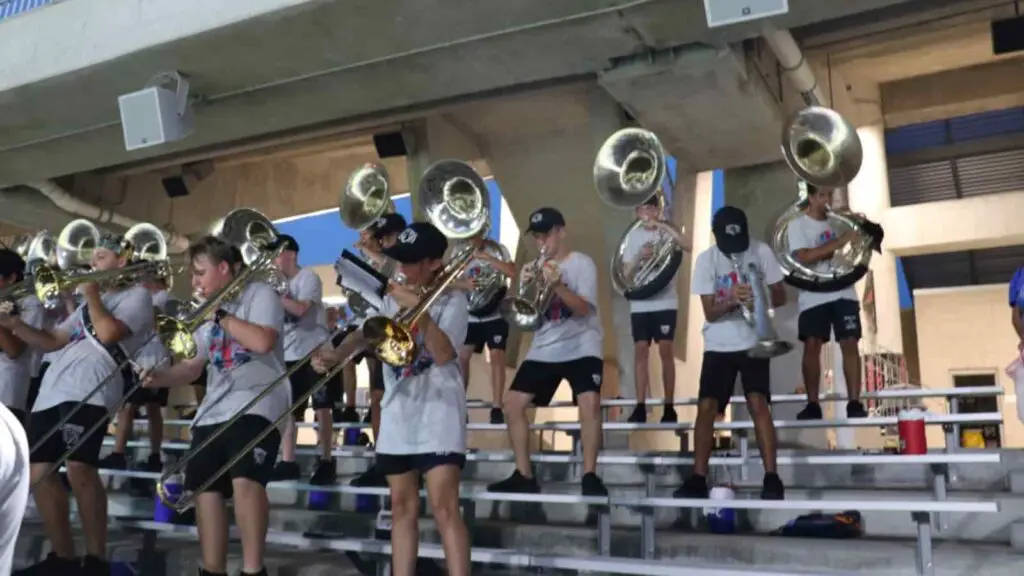
Sectionals may be just your section going to practice music while a senior or member of leadership conducts and runs the rehearsal. Some sectionals are all brass, and another group of all woodwinds.
No matter how the band is divided up, everyone will be working on playing music and breaking down any difficult sections or runs in the chart.
Note: This is not a time to be on the phone or talk the whole time, but some people in your section will be silly or make jokes. Your director will walk around to ensure everyone is playing music and not goofing off too much.
Sectionals are relaxing and are a chance to cool down.
Depending on the weather, after sectionals, everyone will head back out to the field with their horns or remain in the band room. If you are going back outside, this is when you will be learning drill, aka the formations and shapes on the field.
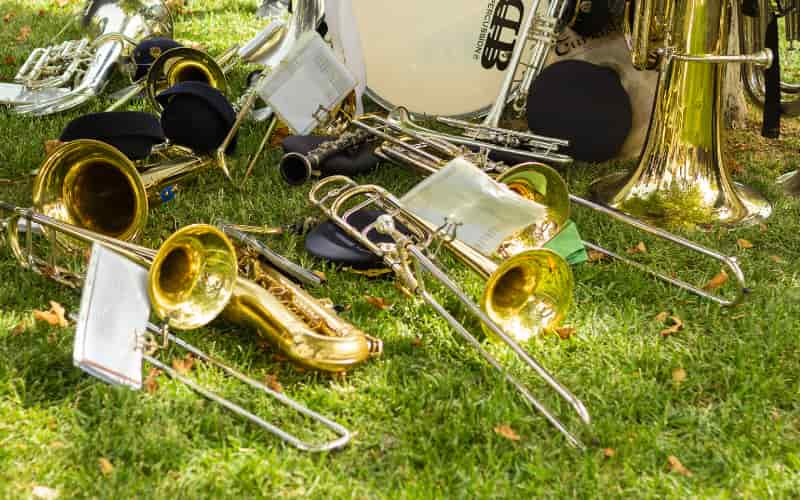
You will be taught how to read a drill or dot book and work on transitioning from one set to the next. Marching band practice during the school year will look like this, cleaning up the drill and adding visual effects like dancing. If it is raining or storming, you will remain inside, and the band will have another full band music rehearsal until it clears up or the day ends.
Your director and adult staff members know it’s been a long and exhausting day and may permit the band to take a little break to have some fun.
You may play games like Simon (or Drum Major) Says, stationary commands, or Statue, where someone walks around and tries to make people laugh while maintaining an attention position. Band camp is hard work, but it should also be fun. That is what happens at band camp, marching, music, and bonding.
Note: This article is part of our Band Camp Series where you can learn all about how to prepare for camp and what to expect. You can check out these other articles in this series as well.
Typical Band Camp Schedule (What to Expect)
Band Camp Essentials (The Ultimate Packing List for Band Camp!)
7. What Should I Wear for Band Camp?
It all depends on what your band director tells you to wear. Your band director may ask you to wear a specific shirt color, and wearing things like spandex biker shorts might not be permitted. If your director doesn’t tell you what to wear, we recommend the following outfits.
For Boys:
- shorts that you can move in, like athletic or basketball shorts
- a light-colored t-shirt to stay cool,
- a hat or sunglasses
- It is essential to wear running or tennis shoes to practice
Shoes are one of the most important things to think about! Your shoes will support all parts of your foot, keep your ankles steady, and can grip grass, turf, and concrete surfaces better than other kinds of shoes. They do not need to be fancy or expensive; as long as they won’t fall apart and don’t hurt your feet, they will do.
Note: For more information about what shoes we recommend consider checking out this article! Best Shoes for Marching Band (Read This First!)
For Girls:
- Athletic or running shorts or wear spandex shorts under athletic shorts so you won’t show too much while stretching and moving around.
- A tank top or light-colored t-shirt is appropriate for band camp; it will help keep you cool.
- It will help to wear a sports bra to band camp; you will be more comfortable, have proper support, and prevent back pain.
- Like the boys, wearing athletic or tennis shoes is a must for band camp.
- You can wear a hat, and sunglasses are highly recommended.
What Not to Wear at Band Camp
Stay away from dark colors of clothes that absorb heat. Instead, go for light colors or pastels. It will be hot outside, and lighter colors will keep you cooler than dark ones.
You should wear something you can move in and feel comfortable in. Think of band camp and marching band practice as if it was an athletic sport instead of a fashion show.
8. Do I Need to Know How to March Before Attending Band Camp?
No! If this is the first time you are attending a marching band camp, you will learn. Most of camp is spent learning how to march and transition between different maneuvers. Upperclassmen will know how to march but are there to review and freshen up their marching skills.
The whole point of going to marching band camp is to learn how to march! Don’t worry if you have never stepped foot on a football field before; camp is to help prepare you for performances.
Everyone comes into band camp for the first time not knowing how to march, but they will finish camp with great marching skills.
Note: Some bands will have a pre-camp week where new students come to learn the fundamentals. Upper-classmen will be there to help you and teach you everything you will need to know.
My first year in Marching Band was not in high school, but as a freshman in College. I was 1 of 2 members that had never marched before. That first year was very intimidating and nerve-wracking for me, but everyone was very understanding and helpful. Once I got over the nerves I loved every minute of it!
Jennifer SEegmiller – Editor of Top Music Tips
9. Why is Band Camp Mandatory?
Band camp is mandatory because it is the most time the whole band can work on learning or reviewing how to march, practice and clean up music, and learn drill.
You will be surprised how soon the first football game of the season is after the first day of school. Band camp is the time to learn some of the show so you can entertain the crowd during halftime right away.
Your drill needs to be crisp and clean on the field. Your music must be well rehearsed, and you need to be familiar with the music and cheers you will perform in the stands.
Band camp is when you have the opportunity to do all of that all day. Mandatory band camp is also a time to build a team relationship and work together towards one common goal: killing it on the field at halftime and in competitions.
10. What are Good Snacks to Bring to Band Camp?
Foods that are good to bring as a snack for band camp are similar to what you should eat for breakfast in the morning. Things like trail mix, bananas, beef jerky, and granola bars are excellent choices.
Crackers like Goldfish Crackers or Cheez-Its are good options because they have salt and carbs, which your body will be lacking after sweating outside.
Tip: For more ideas about great snacks or food to have in band you can check out this list we made. 20 Marching Band Camp Meal Ideas (Feeding a Hungry Band)
It’s also okay to bring a cookie or two to give you a little sugar boost to keep your energy up as the afternoon goes on. Healthy snacks are always a good idea, and having a Gatorade or Powerade for lunch is also worth considering.
11. Will I Make Friends at Band Camp?
YES! It is so easy to make friends at band camp.
Everyone there loves being in a band, playing music, and are into marching band, just like you are.
Starting high school can be intimidating, but not when you go to band camp. You will meet other freshmen and upperclassmen before the first day of school, so on your first day, there are people in the courtyard who you can stand and talk with.
If your band director opens the band room before school starts, most band kids will congregate there and usually sit or stand around and talk until the bell rings.

Marching band is a family, not an extracurricular activity. The marching band members will be people you spend a few days after school, most Friday nights, and occasional Saturdays (for competitions) with.
You may not be friends with everyone, but you will make so many friends at band camp, and the transition into high school can feel less stressful.
Your band friends have had the same teachers you do, and they can give great advice on how to study for your class or where to get help with homework in some cases.
Some people make fun of the “band kids,” but these are the friends you will grow close to and remain friends with through college and even after you finish school. Come to camp ready to meet people and know that band camp is genuinely a judgment-free zone.
We hope this article has been helpful and informative for you in your musical journey. Please let us know if there is anything that we could add or change to make this article a better resource for our readers.
Please e-mail us at: [email protected] to let us know how we are doing!
Disclaimer: This post may contain affiliate links. We only recommend high-quality products that are used and recommended by real musicians. If you use these links to buy something we earn a small commission.
